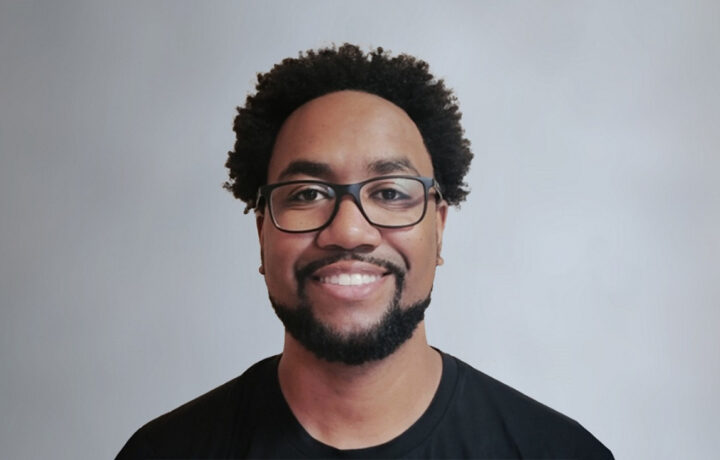Many emerging technologies present a double-edged sword—and thorny dilemmas. How can we harness innovation to improve lives and society? How can we avoid unintended, unforeseen harm?
Dr. Byron Gaskin explores questions about artificial intelligence (AI) and more at Booz Allen in his multifaceted role as an AI subject matter expert and senior data scientist focusing on health.
“We’re living in an interesting time,” says Byron. “A lot of AI concepts have existed for a while, but now we have the infrastructure to test and deploy these systems. That comes with its own set of issues.”
Here Byron shares his career path to the AI field, what he’s been working on at Booz Allen, and how to “make sure AI works in the way we would like it to, to build the future we want.”
Exploring a World of Thought, from Philosophy to Physics
Byron is an engineer by training. He earned his bachelor’s degree in mechanical engineering from Florida International University, followed by a master’s degree in mechanical engineering and a Ph.D. in bioengineering from Pennsylvania State University. He applies this knowledge as a data scientist working with high-performance computing and large-scale analytics.
His interests don’t end there, however. As an undergraduate, he was in an honors program focused on social sciences. Immersive classes introduced him to the Greek philosophers, the history of democracy, and more.
“I was learning about these things all while taking calculus and physics. It really opened up the non-engineering side of thought for me,” he says.
These experiences provided a rich foundation for what drives him today: working on projects where the digital world meets the physical world, exploring how society interacts with emerging technologies, and understanding how technology affects minority communities.
A Pivotal Research Program and Presentation
After his university studies, Byron applied what he’d learned to a variety of scientific research projects in healthcare and defense. But he ultimately wanted to move from traditional research, where it can take years to make a difference in the field, into “something more present and hands-on.”
A unique fellowship at the National Institute of Allergy and Infectious Diseases (NIAID) fit the bill. With a focus on “high-risk, high-reward” programs and projects spanning only 90 days, “I thought it was too good to be true,” he says.
Meanwhile, AI was on the rise, in headlines as well as in his work. “I started thinking back to my ethics courses and the societal implications of these emerging technologies,” he says. To explore things further, he explored the Washington, DC, tech scene, joining in groups like the Black Code Collective and giving presentations of his own.
“People knew I was an AI developer, and they asked me to give a talk on how AI has affected and can affect Black communities,” he says. After the presentation, he met an audience member who worked for Booz Allen and stayed in touch. And when his fellowship at NIAID ended, he reached out.
Learning, Sharing Knowledge, and Having Fun
Byron says he chose Booz Allen because he appreciated the breadth and impact of the work and the freedom to work across a variety of projects, even as he advances in his career.
“I want to straddle the line between managing and staying active in development and building new AI, because I still code and read math books for fun,” he says.
For clients, he has helped write data use policies and studied AI’s potential for pain detection in cancer patients. And as one of Booz Allen’s AI subject matter experts, he’s helping to shape the firm’s knowledge in this transformative area—from materials and long-term strategy around ethical AI to curricula for firmwide trainings.
Visitors to Booz Allen’s new Helix Center for Innovation will find Byron’s presence there as well. He’s deputy technology lead of the AI Studio, developing curricula, building the AI models that visitors can see on display, and even starring in the center’s welcome video.
“I’m having a fun time working on really cool stuff,” he says.
He’s looking for others from all backgrounds to join him. “We need to make sure our teams are multidisciplinary—technologists and scientists paired with folks who understand legal, marketing, and business development to explore how to solve a problem, but also social scientists to think through why a particular problem requires solving,” he says. “It’s no longer a nice-to-have for a business. You need it to compete.”
Learn more about artificial intelligence and careers at Booz Allen.
Join us. The world can’t wait.
Search Careers




